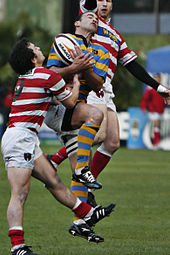See also: List of rugby union playing countries
Japanese and Welsh rugby fans in Cardiff, Wales
At least six countries have adopted rugby union as their de facto national sport; they are Fiji,[104] Georgia,[105][106] New Zealand,[107] Samoa,[108] Tonga[109] and Wales.[110]
Oceania
A rugby club was formed in Sydney, New South Wales, Australia in 1864; while the sport was said to have been introduced to New Zealand by Charles Monro in 1870, who played rugby while a student at Christ's College, Finchley.[14]Several island nations have embraced the sport of rugby. Rugby was first played in Fiji circa 1884 by European and Fijian soldiers of the Native Constabulary at Ba on Viti Levu island.[111][112] Fiji then sent their first overseas team to Samoa in 1924, who in turn set up their own union in 1927.[113] Along with Tonga, other countries to have national rugby teams in Oceania include the Cook Islands, Niue, Papua New Guinea and the Solomon Islands.[114]
North America and Caribbean
See also: Rugby Americas North
In North America a club formed in Montreal in 1868, Canada's first club. The city of Montreal also played its part in the introduction of the sport in the United States, when students of McGill University played against a team from Harvard University in 1874.[14][103]Although the exact date of arrival of rugby union in Trinidad and Tobago is unknown, their first club Northern RFC was formed in 1923, a national team was playing by 1927 and due to a cancelled tour to British Guiana in 1933, switched their venue to Barbados; introducing rugby to the island.[115][116] Other Atlantic countries to play rugby union include Jamaica[117] and Bermuda.[118]
Europe
Germany playing Belgium
Other European rugby playing nations of note include Russia, whose first officially recorded match is marked by an encounter between Dynamo Moscow and the Moscow Institute of Physical Education in 1933.[120] Rugby union in Portugal also took hold between the First and Second World Wars, with a Portuguese National XV set up in 1922 and an official championship started in 1927.[121]
In 1999, FIRA agreed to place itself under the auspices of the IRB, transforming itself into a strictly European organising body. Accordingly, it changed its name to FIRA–AER (Fédération Internationale de Rugby Amateur – Association Européenne de Rugby). It adopted its current name of Rugby Europe in 2014.
South America
Asia
Main article: Rugby union in Asia
Many Asian countries have a tradition of playing rugby dating from the British Empire. India began playing rugby in the early 1870s, the Calcutta Football Club forming in 1873. However, with the departure of a local British army regiment, interest in rugby diminished in the area.[127] In 1878, The Calcutta Football Club was disbanded, and rugby in India faltered.[128] Sri Lanka
claims to have founded their union in 1878, and although little
official information from the period is available, the team won the
All-India cup in Madras in 1920.[129] The first recorded match in Malaysia was in 1892, but the first confirmation of rugby is the existence of the HMS Malaya Cup which was first presented in 1922 and is still awarded to the winners of the Malay sevens.[130]Rugby union was introduced to Japan in 1899 by two Cambridge students: Ginnosuke Tanaka and Edward Bramwell Clarke.[131][132] The Japan RFU was founded in 1926 and its place in rugby history was cemented with the news that Japan will host the 2019 World Cup.[133] It will be the first country outside the Commonwealth, Ireland and France to host the event, and this is viewed by the IRB as an opportunity for rugby union to extend its reach,[133] particularly in Asia. Other Asian playing countries of note include Singapore, South Korea, China and The Philippines, while the former British colony of Hong Kong is notable within rugby for its development of the rugby sevens game, especially the Hong Kong Sevens tournament which was founded in 1976.[134]
Rugby in the Middle East and the Gulf States has its history in the 1950s, with clubs formed by British and French Services stationed in the region after the Second World War.[135] When these servicemen left, the clubs and teams were kept alive by young professionals, mostly Europeans, working in these countries. The official union of Oman was formed in 1971.[136] Bahrain founded its union a year later, while in 1975 the Dubai Sevens, the Gulf's leading rugby tournament, was created. Rugby remains a minority sport in the region with Israel, as of 2011, being the only member union from the Middle East to be included in the IRB World Rankings.[137]



No comments:
Post a Comment